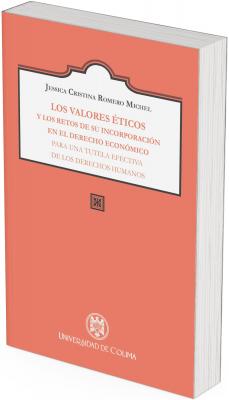Ethical Values and the Challenges of its Incorporation to Economic Law for an Effective Tutelage of Human Rights
Keywords:
Ethical values, Economic Law, human rightsSynopsis
The research that I develop, is carried out from a view of functionalism, in order to try and demonstrate that on the basis of principles such as dignity, which is foreseen in article 25 of the Political Constitution, as well as the right to be, the right to belong, and the right to access, elements are configured which are incorporated into the tutelage of the comprehensive development of people and of groups of people.
Downloads
References
Trebilcock, Michael y Davis, William. (1999). What role do legal Institutions play in development. Consultado en: http://www.imf.org/external/pubs/ft/seminar/1999/reforms/trebil.pdf.htm
Sandel, Michael. (2013). Lo que el dinero no puede comprar: Los límites morales del mercado. Trad. del inglés de Joaquín Chamorro Mielke. Barcelona: Random House Mondadori, p. 84.
Reforma constitucional publicada en el Diario Oficial de la Federación el 3 de febrero de 1983.
Jeammaud, Antoine. (1986). Crítica del derecho en Francia. De la búsqueda de una teoría materialista del derecho al estudio crítico de la regulación jurídica. En Miaille, Michel. La Crítica Jurídica en Francia. UAP. México, p. 51.
Surge con la Comisión Mundial sobre Ambiente y Desarrollo, creada en virtud de la resolución 38/161 de la Asamblea General, aprobada por el 38° periodo de sesiones de las Naciones Unidas en otoño de 1983, y que en abril de 1987 presentó su informe "Nuestro futuro común", comúnmente denominado "Informe Brundtland" por el nombre del Presidente de la Comisión, Gro Harlem Brundt¬land. En: http://www.un.org/es/comun/docs/?symbol=A/42/427
Laville, Jean-Louis. (2009). Definiciones e instituciones de la economía, Coraggio, José Luis. (2009). De la definición de Polanyi, Karl. (2008). "L'économie en tant que procèsinstitutionnalisé", en Essais de Karl Polanyi, pp. 53-78. Paris, Seuil.
González, Raúl. (2010). La socioeconomía, ¿Nuevas luces para entender los fenómenos económicos? Ponencia en el Primer Congreso Maulino de Discernimiento Teológico. 17 de junio de 2010.
Conferencia Mundial de Derechos Humanos. (1993) Viena. Disponible en: http://www.unhchr.ch
Manifiesto por una economía ética global. Proclamado en la sede las Naciones Unidas en Nueva York, ciudad global, el 6 de octubre de 2009. Este manifiesto tiene como antecedente la Declaración "Hacia una ética mundial" de 1993.
Cfr. Coraggio, José Luis, y Polanyi, Karl. (2009). La economía social y solidaria en América Latina.
Sen, Amartya. (2002). Desarrollo y libertad. Bogotá: Planeta. P. 22.
Sandel, Michael. (2013). Lo que el dinero no puede comprar: Los límites morales del mercado. Trad. del inglés de Joaquín Chamorro Mielke. Barcelona: Random House Mondadori. Pp. 47 y 48.
Sen, Amartya. (2002). Desarrollo y libertad. Bogotá: Planeta. P. 25.

Published
Series
Categories
License

This work is licensed under a Creative Commons Attribution-NonCommercial-ShareAlike 4.0 International License.







